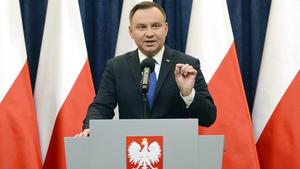 Polish President Andrzej Duda announces his decision to sign a legislation penalizing certain statements about the Holocaust, in Warsaw, Poland, Feb 6, 2018. (AP PHOTO / ALIK KEPLICZ)
Polish President Andrzej Duda announces his decision to sign a legislation penalizing certain statements about the Holocaust, in Warsaw, Poland, Feb 6, 2018. (AP PHOTO / ALIK KEPLICZ)
WARSAW -Poland’s lower house of parliament gave the green light on Thursday for a presidential election to be held by postal vote following a dispute over whether the vote could take place during the coronavirus pandemic.
The election was scheduled to take place on Sunday but the opposition said the ruling nationalist party, Law and Justice (PiS), would be putting political gain ahead of public health if it went ahead on that date.
PiS, a nationalist grouping with a left-leaning economic agenda, has been keen for a vote as soon as possible because opinion polls show Duda would win re-election if it were held now
PiS and its junior coalition partner, Accord, reached an agreement on Wednesday on postponing the election in anticipation that the Supreme Court will declare election planned for Sunday are not valid so a new date could be announced.
Though the Sejm, or lower house of parliament, approved legislation allowing a postal vote, the timing of the vote still remains unclear, with PiS saying on Thursday that June was now the earliest date it could take place.
“Yesterday we worked out a solution which is good for Poland, which guarantees safe, fully democratic and transparent elections,” Accord party leader Jaroslaw Gowin told reporters on Thursday before the parliamentary vote.
While there was a sense of relief among many Poles that the nation would not be forced into an election during the coronavirus pandemic, government critics said it was unclear what legal basis PiS had to cancel Sunday’s vote.
PiS and its ally have said they anticipated that the Supreme Court would void the vote and that the parliamentary speaker would then announce a new date. Critics have said that could violate election rules.
Poland’s President Andrzej Duda said on Thursday that he hopes the presidential election will be held as soon as possible. Deputy Prime Minister Jacek Sasin said the election will be held in June at the earliest.
ALSO READ:Poland's May 10 presidential election hangs in balance
Adam Bielan, the campaign spokesman for President Duda, a PiS ally favored to win re-election, told private broadcaster TVN24 that he expected a new election to be held in late June or early July. Other politicians said it could be held as late as the end of July. Duda’s term ends in August.
PiS, a nationalist grouping with a left-leaning economic agenda, has been keen for a vote as soon as possible because opinion polls show Duda would win re-election if it were held now.
ALSO READ: Polish conservatives win lower house but lose Senate
The party needs the president’s support to make further progress in its judiciary overhaul, which the European Union has said subverts the rule of law by politicising courts.
Last week, PiS installed a former justice ministry official as acting chief of the Supreme Court, following the retirement of one of the party’s most vocal critics.
READ MORE: EU commissioner: Polish presidential postal ballot raises concern
In power since 2015, the party says it inherited a court system run by self-serving elites and steeped in communist-era power structures, with its reforms aiming to make it more efficient and fair.
JUGGLING DATES
According to health ministry data, Poland has 14,740 confirmed coronavirus cases and 733 deaths.
The opposition and international election observers had said that changing election rules so soon before balloting meant it would not be free or fair.
One constitutional expert said Wednesday’s announcement appeared to contradict constitutional provisions in Poland for changing election dates.
READ MORE:EU opens new legal case against Poland over muzzling judges
“It’s astounding,” Ryszard Piotrowski of Warsaw University said. “How can you imagine in a democratic country that politicians decide what the Supreme Court will rule.”
Opposition critics said the announcement also raised questions over the coalition’s adherence to rule-of-law norms.
“It’s an unprecedented situation, in a sense that a plan has been developed that engages independent institutions such as the Supreme Court,” a senior lawmaker from the opposition Civic Platform, Tomasz Siemoniak, told Reuters.
“We are rather careful in evaluating the plan because we don’t know any details and we don’t know what it will mean in the coming days.”
A PiS member of the European Parliament, Ryszard Czarnecki, said the agreement showed the governing coalition was intact and that a new date would mitigate any health concerns.
“First of all, we continue to have a majority in parliament,” Czarnecki said. “We have a majority and that’s the most important thing.”


